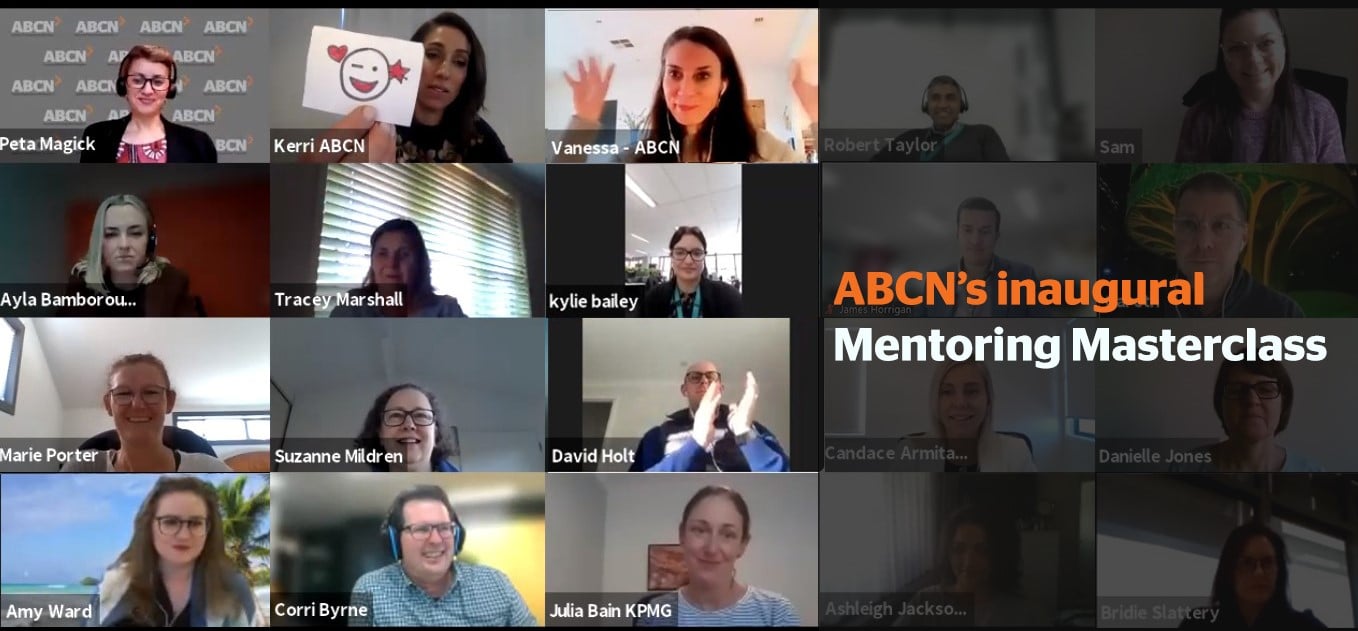Top tips to become a mentoring master
Amp up your facial expressions when mentoring online was one of the many suggestions ABCN mentors heard at our first-ever Mentoring Masterclass.
Listening and storytelling are crucial elements of great mentoring, and doing it online requires some additional practical considerations. These were key themes of ABCN’s inaugural Mentoring Masterclass attended by almost 100 volunteers from our member companies.

With so many people across the country stuck at home in lockdown, the tips about how to be engaging online are especially important right now. Kerri Blackstone, who led the webinar and is a master ABCN facilitator herself, told participants that being completely present for your mentee was a challenge at home due to distractions. She suggested turning off email notifications as well as your phone. Eye contact is vital so try to look directly at your camera. And be mindful of demonstrating engagement by using lots of facial expressions and gestures.
Great mentoring – whether online or in-person – involves active listening, imparting knowledge, sharing life lessons and telling personal stories in a way that helps mentees feel validated and supported.
The impact is even more significant for students from low socio-economic backgrounds with minimal exposure to the world of work. Our former students often tell us that genuine conversations with their #ABCN mentors positively impacted their lives.
And the benefit goes both ways. In 2020, 94% of our mentors said they developed personally from taking part in an ABCN program.
Here are more takeaways from the Mentoring Masterclass to ensure the two-way journey is a meaningful one for both participants:
- Use non-verbal cues like nodding your head and showing your hands.
- Be empathetic (‘I understand how you feel’) rather than sympathetic (‘I’m sorry for the way you feel’).
- Listen actively rather than responding immediately.
- Tell authentic stories to create a genuine bond. Have a few ready, eg learning from a ‘fabulous fail’ or a time you had to make a tough decision.
- Keep all electronic devices like your phone and laptop out of sight and out of mind.
- Don’t lose patience if you can’t strike rapport in the first attempt; it takes time to gain trust.
- Don’t let your own agenda guide the conversation; instead, give ample space to your mentee to share their thoughts and feelings.
- Refrain from ranking your mentee’s pain and experiences; treat all of them uniquely.
- Be open-minded and respectful of different cultures and traditions.
- Don’t underestimate your value and impact on students’ lives.
You can watch the complete video here to learn more about the benefits to the mentee and mentor, the qualities and skills of great mentors, and how to transfer those skills to your workplace.
Read more stories here
sign up to our free newsletter
Please enter your details below.